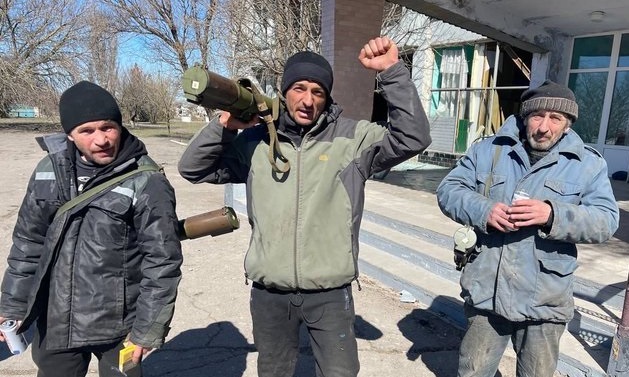Russian Army in full retreat as weekend fightback picks up: Ukrainian forces retake Kyiv suburbs despite fear of booby-traps

Ukrainian forces are taking back suburbs and other areas surrounding capital Kyiv this weekend, and they have reportedly moved to retake territory north of the country’s capital amid fears that Russian forces might have set booby-traps before leaving.
Ukrainian President Volodymyr Zelensky warned in his nightly video address hours earlier that departing Russian troops were creating a “catastrophic” situation for civilians by leaving mines around homes, abandoned equipment and “even the bodies of those killed”.
Journalists in Bucha, a suburb north-west of Kyiv, watched as Ukrainian soldiers backed by a column of tanks and other armoured vehicles used cables to drag bodies off of a street from a distance, fearing they might have been rigged to explode.
Locals said the dead were civilians who were killed by departing Russian soldiers without provocation.
Ukraine and its Western allies reported mounting evidence of Russia withdrawing its forces from around Kyiv and building its troop strength in eastern Ukraine.
Ukrainian fighters reclaimed several areas near the capital after forcing the Russians out or moving in after them, officials said.
The visible shift did not mean the country faced a reprieve from more than five weeks of war or that the more than four million refugees who have fled Ukraine will return soon.
Mr Zelensky said he expects departed towns to endure missile strikes and rocket strikes from afar and for the battle in the east to be intense.
“It’s still not possible to return to normal life, as it used to be, even at the territories that we are taking back after the fighting. We need wait until our land is demined, wait till we are able to assure you that there won’t be new shelling,” the president said during his nightly video address, though his claims about Russian mines couldn’t be independently verified.
Moscow’s focus on eastern Ukraine also kept the besieged southern city of Mariupol in the crosshairs. The port city on the Sea of Azoz is located in the mostly Russian-speaking Donbas region, where Russia-backed separatists have fought Ukrainian troops for eight years.
Military analysts think Russian President Vladimir Putin is determined to capture the region after his forces failed to secure Kyiv and other major cities.
Mariupol
The International Committee of the Red Cross planned to try to get into Mariupol to evacuate residents. The Red Cross said it could not carry out the operation on Friday because it did not receive assurances the route was safe. City authorities said the Russians blocked access to the city.
The humanitarian group said a team with three vehicles and nine Red Cross staff members was headed to Mariupol on Saturday to help facilitate the safe evacuation of civilians. It said its team planned to accompany a convoy of civilians from Mariupol to another city.
“Our presence will put a humanitarian marker on this planned movement of people, giving the convoy additional protection and reminding all sides of the civilian, humanitarian nature of the operation,” it said in a statement.
Ukraine’s deputy prime minister, Iryna Vereshchuk, said 765 Mariupol residents reached Zaporizhzhia on Saturday in private vehicles.
Mariupol, which was surrounded by Russian forces a month ago, has suffered some of the war’s worst attacks, including on a maternity hospital and a theatre that was sheltering civilians.
Around 100,000 people are believed to remain in the city, down from a pre-war population of 430,000, and they are facing dire shortages of water, food, fuel and medicine.
The city’s capture would give Moscow an unbroken land bridge from Russia to Crimea, which it seized from Ukraine in 2014. But its resistance has also has taken on symbolic significance during Russia’s invasion, said Volodymyr Fesenko, head of the Ukrainian think-tank Penta.
“Mariupol has become a symbol of Ukrainian resistance, and without its conquest, Putin cannot sit down at the negotiating table,” Mr Fesenko said.
An adviser to Mr Zelensky, Oleksiy Arestovych, said in an interview with Russian lawyer and activist Mark Feygin that Russia and Ukraine had reached an agreement to allow 45 buses to drive to Mariupol to evacuate residents “in coming days”.
On the outskirts of Kyiv, signs of fierce fighting were everywhere in the wake of the Russian redeployment. Destroyed armoured vehicles from both armies left in streets and fields and scattered military gear covered the ground next to an abandoned Russian tank.
Ukrainian forces recaptured the city of Brovary, about 12 miles east of the capital, Mayor Ihor Sapozhko said on Friday night. Shops were reopening and residents were returning but “still stand ready to defend” their city, he added.
Elsewhere, at least three Russian ballistic missiles were fired late Friday at the Odesa region on the Black Sea, regional leader Maksim Marchenko said.
The Ukrainian military said the Iskander missiles did not hit the critical infrastructure they targeted in Odesa, Ukraine’s largest port and the headquarters of its navy.
Arrests in Russia
A Russian group that monitors political arrests says 208 people were detained in demonstrations held on Saturday across the country protesting over Russia’s military operation in Ukraine.
The OVD-Info group said demonstrations took place in 17 Russian cities, from Siberia to the more densely populated west. More than 70 people were were detained in Moscow and a similar number in St Petersburg, the organisation said.
Video released by another group that monitors protests, Avtozak, showed some detainees being led to police prisoner transports as they smiled and carried flowers.
Others were shown to be more harshly forced into the transports, bent over with their arms pinned behind them.
Russian President Vladimir Putin’s government has cracked down heavily on dissent, even before Russia invaded Ukraine in February.
For all the latest Lifestyle News Click Here
For the latest news and updates, follow us on Google News.

